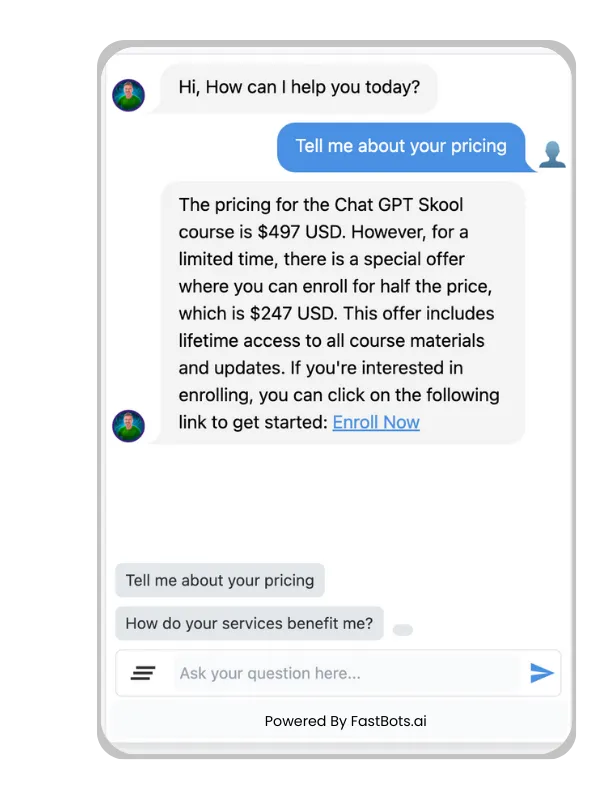Integrate the power of OpenAI's language models directly into your WhatsApp conversations to enhance communication with both personal and business contacts. With a WhatsApp OpenAI chatbot, you can automate responses, generate content, and even create images seamlessly. This technology leverages models like GPT-3.5 to provide intelligent, context-aware replies, offering a more efficient and engaging way to manage interactions.
Setting up a WhatsApp chatbot involves using tools like Python, Twilio, and Flask to build the backend infrastructure. This allows the chatbot to understand and respond to various queries, making it a useful tool for customer support, personal assistance, or simply creating a more interactive chat experience.
Explore how integrating OpenAI with WhatsApp can simplify tasks and improve communication. By using advanced language processing capabilities, you can expect more natural and accurate interactions, transforming how you engage with your contacts on the platform.
BUILD YOUR OWN WHATSAPP AI CHATBOT
In less than 5 minutes, you could have an AI chatbot fully trained on your business data assisting your Website visitors.
Emerging Trends
Recent advancements in AI have led to the integration of OpenAI's powerful models into WhatsApp chatbots, offering enhanced interaction capabilities and new functionalities.
Innovative Strategies
Customer Engagement: WhatsApp chatbots using OpenAI are elevating customer interaction by providing instant responses. This ensures your users experience increased satisfaction and reduced wait times.
Integration with Other Platforms: Beyond WhatsApp, these chatbots are also being integrated with platforms like Instagram and Messenger. This multi-platform approach helps you maintain a consistent presence across various social media channels.
AI-Powered Personalisation: Chatbots now offer personalised responses and recommendations based on user behaviour and preferences. This tailored approach can make interactions more relevant and effective.
Voice Interactions: The latest trends include integrating voice capabilities, enabling you to communicate with chatbots through spoken language. This reduces the barriers to non-text interactions, making technology more accessible.
Technological Advances
Advancements in technology have brought sophisticated tools to the development of AI-powered WhatsApp chatbots, enabling significant improvements in functionality and user interaction.
Next-Generation Technology
Python is commonly used to build these chatbots due to its simplicity and the robust library support it offers. Integrating with Twilio allows seamless interaction with the WhatsApp API.
OpenAI's GPT-3.5 series provides the core AI capabilities. This model can generate human-like text responses, enhancing the chatbot's ability to understand and engage in complex conversations.
Flask may be used to set up the necessary APIs, creating a responsive and efficient environment for your chatbot.
- Twilio Account
- Python 3.7+
- Flask for API setup
Impact Assessment
The implementation of a WhatsApp OpenAI chatbot can enhance your business operations. It provides immediate, accurate responses to customer queries, improving user satisfaction. Quick resolution of issues can bolster your brand's reputation.
A key benefit is automation. Repetitive tasks that consume significant human resources can be handled by the chatbot, freeing staff to focus on more complex tasks. This includes responding to FAQs and processing orders.
Cost-savings are another advantage. Chatbots require a lower investment for round-the-clock service compared to hiring additional staff. Operational costs can be reduced significantly over time.
The use of cutting-edge NLP models from OpenAI ensures that your chatbot understands and processes natural language effectively. This leads to meaningful and context-aware conversations with users.
Your chatbot can also collect and analyse customer data. By tracking interactions, it provides valuable insights into customer behaviour and preferences. This data can inform your business strategies and improve your product offerings.
Security is critical. Ensuring your WhatsApp chatbot complies with data privacy regulations protects both your business and your customers. Using trusted platforms like OpenAI and Twilio helps maintain robust security standards.
An effective chatbot can drive engagement and retention. It can send personalised messages, updates, and offers, keeping your audience engaged with your brand. Improved engagement often leads to higher retention rates.
The flexibility of integrating a chatbot with various tools and platforms, such as PostgreSQL for data storage and Twilio for communication, makes it a versatile addition to your tech stack. This integration simplifies managing multiple business functions through one interface.
Strategic Developments
The development of a WhatsApp OpenAI chatbot involves both strategic partnerships and awareness of evolving market trends. Key areas include collaboration with tech partners and understanding shifts in customer needs.
Collaborative Efforts
The collaboration between WhatsApp and OpenAI is pivotal. WhatsApp provides the platform, while OpenAI offers the technology for intelligent responses. You can use available APIs to integrate OpenAI's natural language processing capabilities with WhatsApp's messaging service.
Key Components:
- WhatsApp Business API: Utilise this API to connect your business number with the chatbot.
- OpenAI API: Employ the API to enable the chatbot to understand and respond intelligently.
For example, integrating Flask with Python can streamline the API setup, ensuring efficient communication between WhatsApp and OpenAI's servers.
Market Dynamics
Understanding market dynamics is essential for effectively deploying your chatbot. The demand for AI-driven customer support tools is growing. Businesses are increasingly looking to enhance customer interactions using AI.
Trends to watch:
- Customer Expectations: Customers now expect instant and intelligent responses.
- Technological Advancements: New API features and updates can improve chatbot functionality.
- Competitive Landscape: Stay aware of competitors who use similar technologies.
Using tools like Twilio for communication infrastructure or Node.js for server-side development could further enhance your chatbot's performance, aligning it with current market expectations.

Opportunities and challenges
Implementing a WhatsApp ChatBot using OpenAI's API presents numerous opportunities and challenges.
Opportunities
Enhanced User Interaction: OpenAI's models provide sophisticated natural language processing, enabling fluid and accurate conversations with users.
24/7 Availability: A chatbot can operate round the clock, offering consistent support without the need for human intervention.
Scalability: Chatbots can handle multiple conversations simultaneously, ensuring efficiency, especially during peak times.
Cost-effective: Using a chatbot can reduce operational costs by minimising the need for extensive customer support teams.
Customisation: Tailor the chatbot's responses and functionalities to meet specific business needs and improve customer satisfaction.
Challenges
Integration Complexity: Setting up and integrating a chatbot with WhatsApp and other systems might require technical expertise and time.
Security Concerns: Ensuring data security and privacy is crucial, especially when dealing with sensitive user information.
Accuracy: While highly capable, the chatbot might occasionally provide inaccurate responses, necessitating continuous monitoring and updates.
User Acceptance: Users may prefer human interaction over chatbot communication, affecting the adoption rate.
Maintenance: Regular updates and improvements based on user feedback are necessary to maintain the chatbot's efficiency and relevance.
Frequently Asked Questions
Learn about integrating and creating AI chatbots for WhatsApp using OpenAI's advanced tools. This section addresses common inquiries to help you understand the process and capabilities.
How can a chatbot be integrated with WhatsApp?
What are the steps to creating an AI chatbot for WhatsApp?
Is it possible to deploy an OpenAI-based chatbot on WhatsApp for free?
Where can I find resources or examples of WhatsApp chatbots using OpenAI on GitHub?
What are the features of the best AI chatbots available for WhatsApp?
How does the WhatsApp bot API facilitate the creation and management of chatbots?
BUILD YOUR OWN WHATSAPP AI CHATBOT
In less than 5 minutes, you could have an AI chatbot fully trained on your business data assisting your Website visitors.


